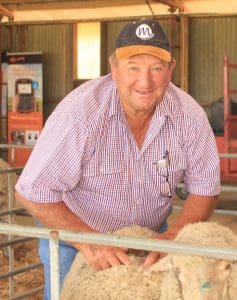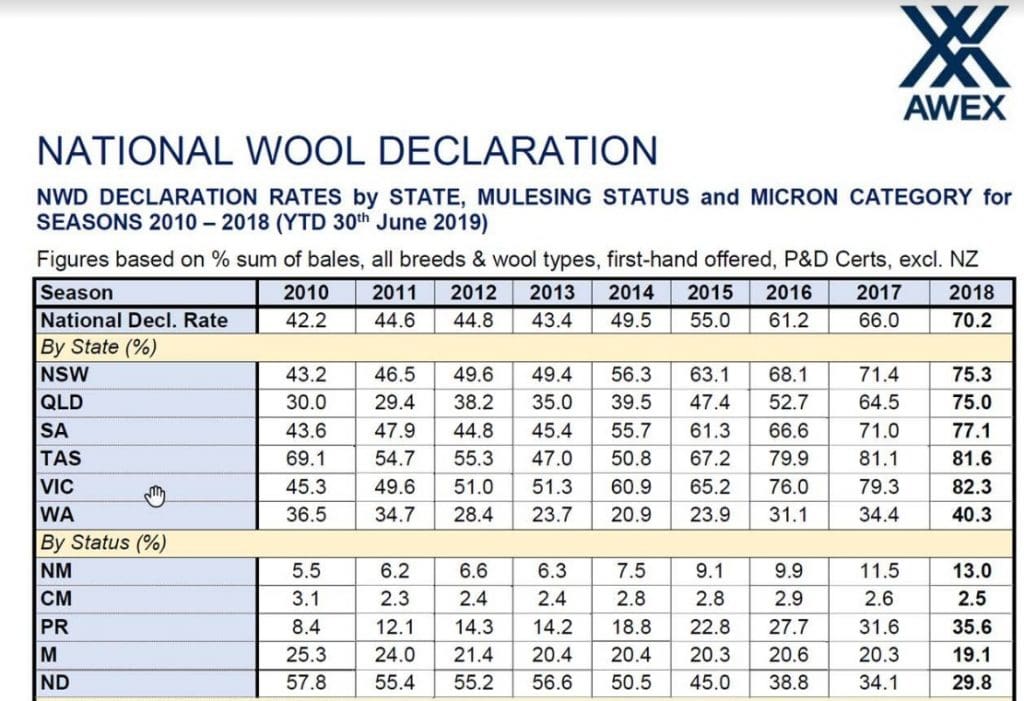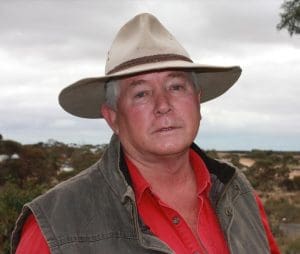
STUD Merino sheep breeders from the four states with the lowest National Wool Declaration rates are opposing a national effort to mandate pain relief for mulesed sheep.
However, Victoria, which had the highest NWD declaration rate of 82.3 percent of first-hand offered bales at auction in 2018-19, looks set to be the first state to enshrine in law mandatory pain relief when mulesing sheep.
And Sheep Central believes the National Council of Wool Selling Brokers of Australia has changed its policy around whether the NWD should be a condition of sale, but will not disclose details.
The resignation of NSW Farmers Wool Committee chairman Andrew Wood from WoolProducers Australia’s board over WPA’s policy to mandate pain relief for the surgical mulesing of sheep has highlighted the state divisions on the issue among stud Merino breeders.

AASMB president Peter Meyer.
At a WPA health and Welfare Committee meeting in November last year, the Australian Association of Stud Merino Breeders delegate New South Wales breeder Drew Chapman reportedly was among those who supported the policy change to mandate pain relief. However, AASMB president Peter Meyer said a subsequent poll of the association’s affiliated state councils showed the New South Wales, South Australia, Queensland and Western Australia associations opposed mandating pain relief. The Victorian and Tasmanian Merino stud associations supported making pain relief mandatory.
This week, NSW Stud Merino Breeders Association vice president Hamish McLaren came out in support of Mr Wood resigning from the WPA board because the body’s stance on pain relief conflicted with NSW Farmers’ policy.
“We all support and encourage animal best practice which includes pain relief, but we do not support a policy of mandatory pain relief,” Mr McLaren said in an email to NSWSMBA members.
Mr Meyer said the body’s policy was to encourage people to use pain relief use when mulesing sheep and Mr Chapman’s stance at the WPA meeting “was a bit of a conflict of interest on Drew’s behalf because he voted and thinks that it should happen.”
Mr Chapman told Sheep Central today that at the WPA committee meeting he personally supported pain relief, but claimed he specified that the WPA change to mandate it be considered by NSWSMBA members.
He would not state whether he personally supported mandatory pain relief, deferring to the current association stance. He has used pain relief when mulesing since it first became available.
“I would have supported it (mandating pain relief) providing our membership supported it, but it has gone back to our membership and it was not supported, so therefore that is the position that I’ve got to take.
“I don’t think any of our membership are not in favour of using pain relief.”
Mr Chapman said the NSWSMBA members felt they couldn’t support mandatory pain relief for mulesing due to concern about associated auditing and costs, and a “widely-held belief” there would be a “knock-on effect” of pain-relief regulation for other practices such as tail docking and castration.
“They are quite happy to support promotion of pain relief, but until it is fully spelled out what mandation fully means and where it goes in terms of auditing, oversight and the rest of it, we won’t support until it.”
Mr Meyer said the issue of whether the NWD become a condition of sale for wool had not been debated by stud breeders.
NWD data reflects state breeder support for mandatory pain relief

The latest NWD figures for 2018-19 show that all states have contributed to a 4.2pc increase in the national declaration rate to 70.2pc. Victoria leads the declaration rate at 82.4pc, ahead of Tasmania on 81.6pc, followed by South Australia on 77.1pc, New South Wales on 75.3pc, Queensland on 75pc and Western Australia on 40.3pc.
The national rate for NWD pain relief declarations for those mulesing sheep has increased from by 4pc to 35.6pc and the number of non-mulesed declarations has increased 1.5pc to 13pc. The number of mulesed declarations has fallen by 1.2pc to 19.1pc and the not-declared rates fell by 4.3pc to 29.8pc. Pain relief statistics for each state are unavailable.

AWEX CEO Mark Grave
AWEX chief executive officer Mark Grave said the declaration increases, especially the 70pc-plus figures for the eastern states, underlined how important the NWD is regarded.
“It doesn’t carry the same level of sensitivity it did, but it is seen as an important vehicle of information.
“And that’s the buyers are crying out for; they’re demanding it and we, as an industry, are starting to supply it in greater numbers, and that’s a good thing.”
AWEX is currently conducting a review of the NWD, but Mr Grave said it was not AWEX’s role to decide on whether the declaration should become a condition of sale. The NWD review submission review deadline was June 30 and submissions are being kept confidential.
“The parties that own the conditions of sale are the brokers themselves.
“We’re pleased it has been successful as a voluntary program, if there are other measures that will get greater compliance or understanding of it, that’s great, but we don’t have a view on that,” he said.
Do brokers support the NWD as a condition of sale?
National Council of Wool Selling Brokers of Australia executive director Chris Wilcox said the latest NWD statistics were a great result, “but we’ve still got 30pc that is not declared.”
Mr Wilcox said the body’s policy on the issue of whether the NWD be a condition of sale “up until now” has been that declaration uptake be driven by the market “and it’s the grower’s decision.” But he admitted that the council had been reconsidering that policy, though he nor the NCWSBA president John Colley would disclose details.
“We have voted on a new policy, but we haven’t discussed whether it be made public or not.
“We’ve put it into our (NWD review) submission, which is not yet public.”
He said mills are now requesting declarations for crossbred clips and there have been small premiums for crossbred wool declared as non-mulesed.
“The point is, it is worth everybody’s while to declare.”
Will Victoria be the first to mandate pain relief for mulesing?

VFF Livestock president Leonard Vallance
The Victorian Farmers Federation Livestock Group supports mandatory pain relief for mulesing and president Leonard Vallance said the body was in discussions with the State Government to include this in Prevention of Cruelty to Animals legislation, to be overhauled as part of the state’s Animal Welfare Action Plan process.
“That will concluded by Christmas-ish and it will be part of it in the state of Victoria anyway.”
Mr Vallance questioned whether there were many growers not using pain relief for mulesing.
“Three fifths of bugger all was our assessment – it is a very precise figure.
“The reality is (mandating pain relief) is not going to have any effect, because it is already in practise, so why don’t we set the agenda here and be ahead of the game?”
Wool leaders urge end to agro-political lobbying

WoolProducers president Ed Storey
WoolProducers Australia president Ed Storey said he concerned that the industry was not “cutting through” into the market with its pain relief story, with three products available. He said WPA had argued in its NWD review submission that the first step in the NWD becoming mandatory was it being a condition of sale.
“The pain relief story is a better good one in this country and we need to get on and talk about the good welfare outcomes from that – that’s what growers are relying on at the moment.
“We believe that to put pain relief on as firm a footing for as long as we need to use it to manage breech flystrike in this country, mulesing with pain relief is a best practice welfare outcome in many situations.
“The previous chairman of AWI (Wal Merriman) advised Senate Estimates that mulesing with pain relief was best practice for welfare, and we believe the wool industry has largely adopted that, according to AWI 85pc of growers use it,” he said.
Commenting on the Victorian plans to mandate pain relief for mulesing, Mr Storey said it is appropriate that regulation follow industry practice “not get ahead of it.”
“What governments do like is when industry gives them the solutions.
“We have the opportunity to manage this through an already existing program,” he said.
“The Australian wool industry wants to take control of our own future and not have others determine it for us.”
Australian Wool Growers Association director Martin Oppenheimer said WPA had been good at including all industry groups on discussing mulesing and pain relief. However, he was concerned that WPA had agreement on mandating pain relief late last year from a majority of groups, but the issue is now “blowing up and everyone is walking away,” because of agro-political lobbying by some individuals.
Mr Storey said he hoped that industry people did not encourage division and distrust over the pain relief issue, “in the interests of their own vision, ahead of the long-term and sustainable future of the industry.”

Glad to see you blokes have agreed pain relief before surgery is a no-brainer. The preference from buyers is increasingly unmulesed wool, so there’s more work to be done.